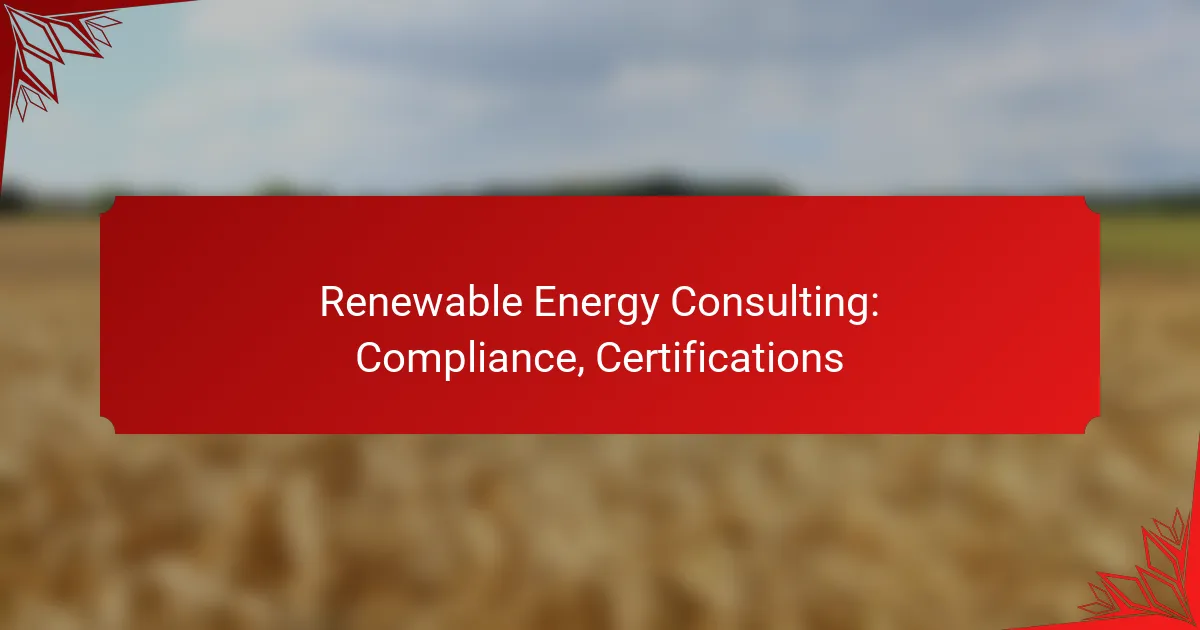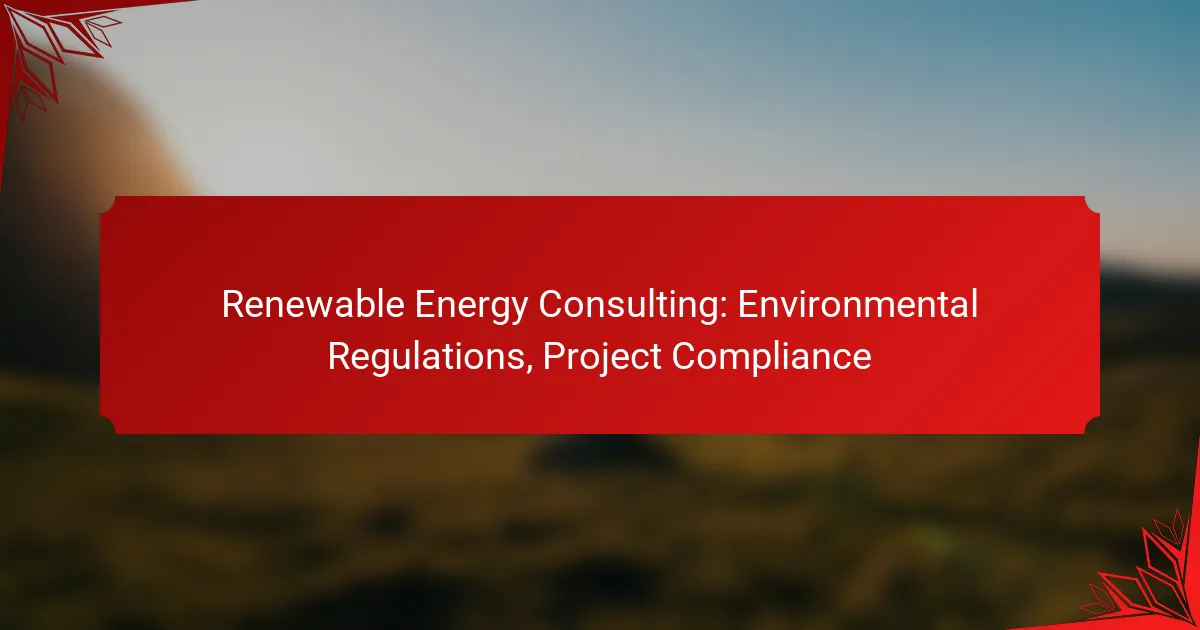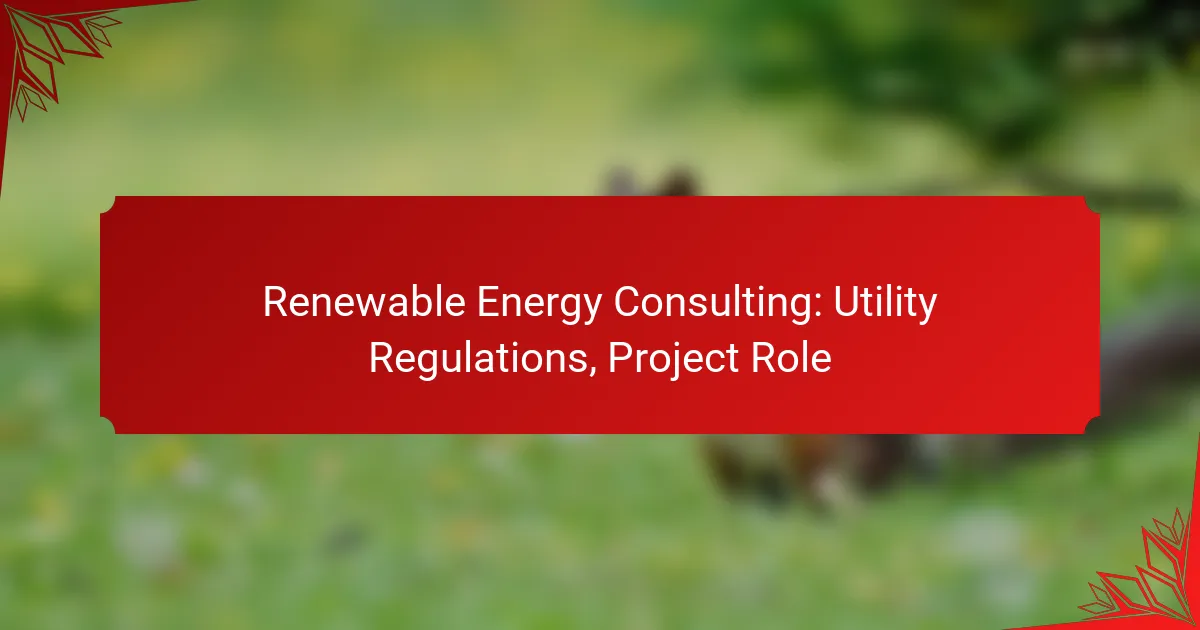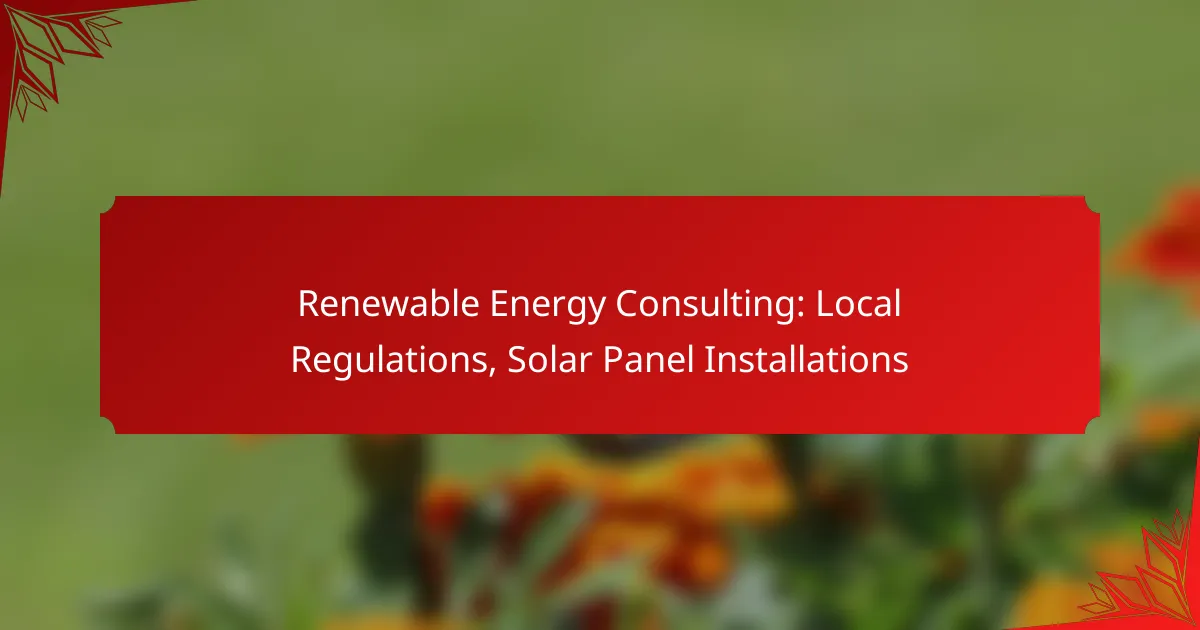Renewable energy consulting plays a crucial role in helping organizations navigate the complex landscape of compliance and certifications. By adhering to federal, state, and local regulations, projects can ensure they meet essential safety and environmental standards. Consulting services provide expert insights and access to best practices, facilitating the certification process and promoting sustainability in energy operations.
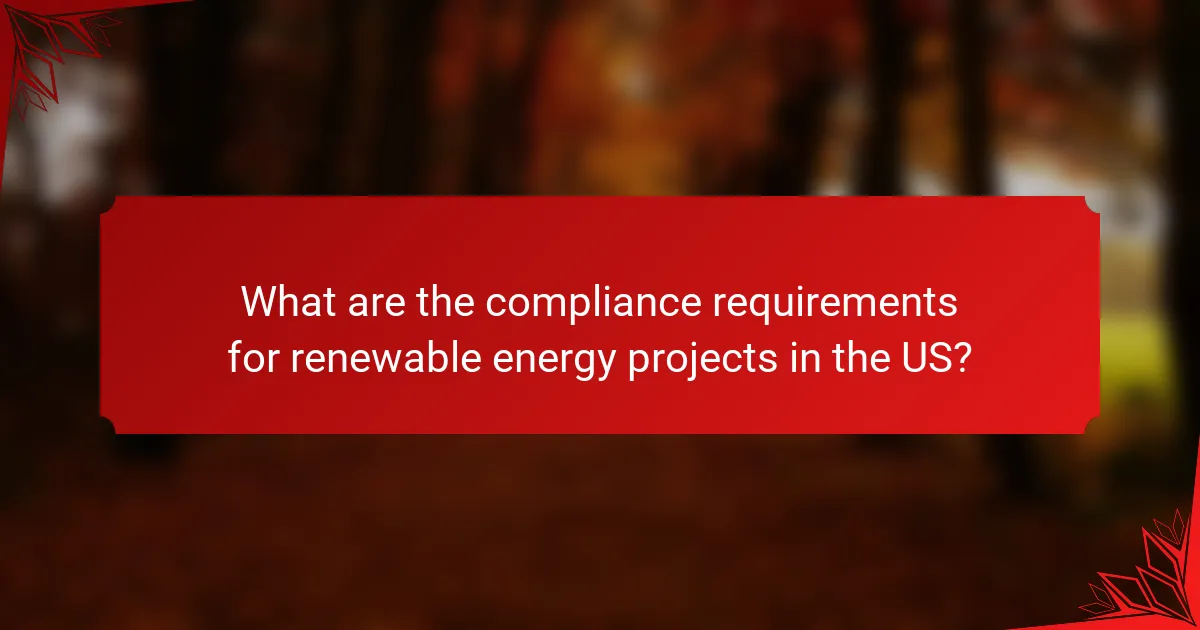
What are the compliance requirements for renewable energy projects in the US?
Compliance requirements for renewable energy projects in the US involve adhering to federal, state, and local regulations that ensure projects meet safety, environmental, and operational standards. Key areas of focus include regulations from the Federal Energy Regulatory Commission (FERC), state-specific renewable energy standards, and guidelines from the Environmental Protection Agency (EPA).
Federal Energy Regulatory Commission (FERC) regulations
The Federal Energy Regulatory Commission (FERC) oversees the interstate transmission of electricity, natural gas, and oil. Renewable energy projects must comply with FERC regulations, which include obtaining necessary permits and ensuring that projects do not adversely affect the reliability of the energy grid.
Developers should be aware of the FERC’s requirements for interconnection agreements and the need for compliance with the Public Utility Regulatory Policies Act (PURPA). These regulations help facilitate the integration of renewable energy sources into the existing energy infrastructure.
State-specific renewable energy standards
Each state in the US has its own renewable energy standards, which dictate the minimum amount of energy that must come from renewable sources. These standards can vary significantly, with some states aiming for ambitious targets of 50% or more renewable energy by 2030.
Developers must research and comply with their specific state’s Renewable Portfolio Standards (RPS) or similar regulations. Failure to meet these standards can result in penalties or the inability to sell energy credits, which are crucial for project financing.
Environmental Protection Agency (EPA) guidelines
The Environmental Protection Agency (EPA) provides guidelines that renewable energy projects must follow to minimize environmental impact. This includes compliance with the Clean Air Act and the Clean Water Act, which regulate emissions and discharges from energy facilities.
Projects often require environmental assessments to identify potential impacts on local ecosystems. Developers should engage with the EPA early in the project planning phase to ensure all necessary permits are obtained and to avoid costly delays.

How to obtain renewable energy certifications?
To obtain renewable energy certifications, organizations must follow specific processes that demonstrate compliance with established standards. These certifications typically involve documentation, assessments, and ongoing evaluations to ensure adherence to environmental and sustainability practices.
LEED certification process
The Leadership in Energy and Environmental Design (LEED) certification process involves several key steps, starting with project registration through the U.S. Green Building Council (USGBC). Applicants must gather documentation that showcases energy efficiency, sustainable site development, and water savings, among other criteria.
Once registered, projects are assessed based on various categories, and points are awarded for meeting specific benchmarks. Achieving a certain number of points leads to different levels of certification: Certified, Silver, Gold, or Platinum. It’s crucial to engage a LEED-accredited professional to navigate the complexities of the process effectively.
ISO 14001 environmental management certification
ISO 14001 certification focuses on establishing an effective environmental management system (EMS). Organizations must develop policies that comply with environmental regulations and demonstrate a commitment to continuous improvement in their environmental performance.
The certification process involves a thorough audit of the EMS, which includes identifying environmental impacts, setting objectives, and implementing procedures. Regular audits and reviews ensure compliance and help organizations maintain their certification status. Engaging a certified auditor can streamline this process and enhance credibility.
Green-e certification for renewable energy
Green-e certification is specifically designed for renewable energy products, ensuring that they meet rigorous environmental and consumer protection standards. To obtain this certification, organizations must provide proof of renewable energy generation and adhere to specific criteria regarding transparency and marketing practices.
The application process includes submitting documentation of energy sources and undergoing an annual verification process. This certification is particularly valuable for companies looking to market their renewable energy offerings, as it builds trust with consumers and distinguishes them in a competitive market.
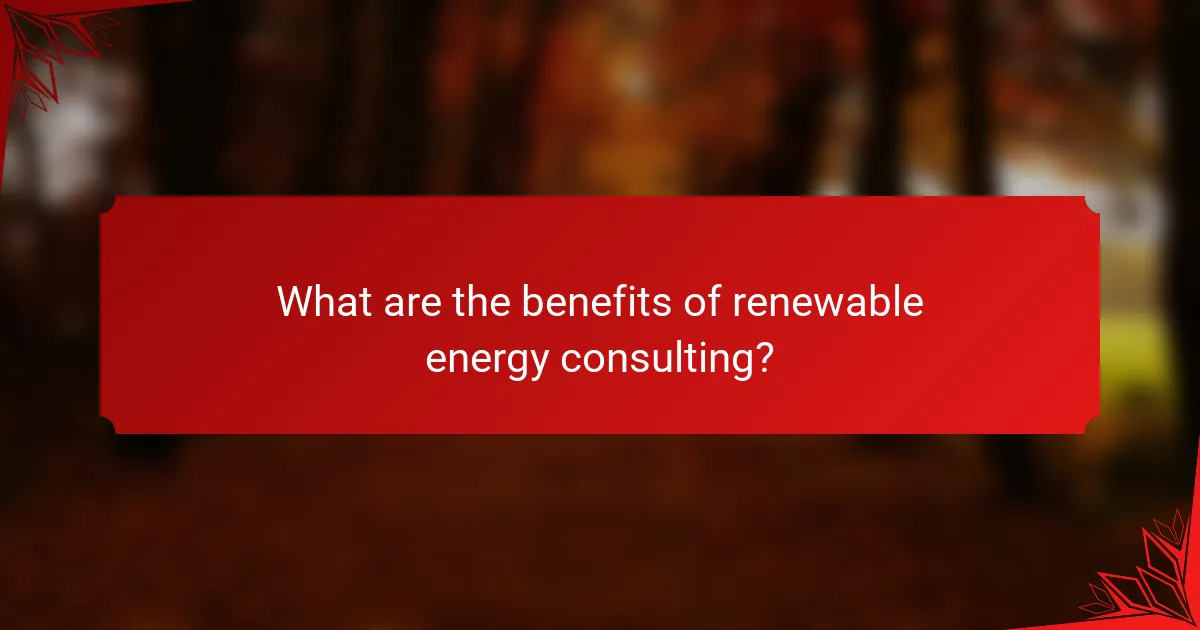
What are the benefits of renewable energy consulting?
Renewable energy consulting offers numerous advantages, including expert insights on compliance, access to industry best practices, and potential cost savings through efficiency improvements. These benefits help organizations navigate the complex landscape of renewable energy regulations and optimize their operations.
Expert guidance on compliance
Compliance with renewable energy regulations can be challenging due to the constantly evolving standards. Consulting firms provide expert guidance to ensure that organizations meet local, national, and international regulations, such as the Renewable Energy Directive in the EU or the Clean Power Plan in the U.S.
Consultants can help identify specific compliance requirements related to emissions, reporting, and certifications. This proactive approach reduces the risk of penalties and enhances the organization’s reputation in the market.
Access to industry best practices
Renewable energy consultants bring a wealth of knowledge about industry best practices, which can significantly enhance project outcomes. They can share insights on successful strategies for project development, technology selection, and operational efficiency.
By leveraging these best practices, organizations can improve their project timelines and reduce risks associated with implementation. This access can be particularly valuable for companies entering new markets or adopting innovative technologies.
Cost savings through efficiency improvements
Consulting services often lead to substantial cost savings by identifying areas for operational efficiency. By analyzing energy consumption patterns and resource allocation, consultants can recommend strategies that lower operational costs and improve energy performance.
For example, implementing energy management systems or optimizing supply chains can yield savings of 10-30% in energy costs. These improvements not only enhance profitability but also contribute to sustainability goals, making them attractive to stakeholders.

How to choose a renewable energy consulting firm?
Choosing a renewable energy consulting firm involves assessing their expertise, client feedback, and the range of services they offer. Prioritize firms with a proven track record in compliance and certifications relevant to your specific project needs.
Evaluate industry experience
Industry experience is crucial when selecting a renewable energy consulting firm. Look for firms that have worked on similar projects or within your specific sector, whether it’s solar, wind, or bioenergy. A firm with several years of experience is likely to have a deeper understanding of regulatory requirements and best practices.
Consider their history with local regulations and standards, as these can vary significantly by region. Firms familiar with your area’s compliance landscape will be better equipped to navigate the complexities of your project.
Check client testimonials and case studies
Client testimonials and case studies provide insight into a consulting firm’s reliability and effectiveness. Look for reviews that highlight successful projects and satisfied clients, as these can indicate the firm’s ability to deliver results.
Request case studies that are relevant to your project type. A good firm will readily share examples of past work, showcasing their problem-solving skills and the outcomes achieved for clients in similar situations.
Assess service offerings and specializations
Different consulting firms may specialize in various aspects of renewable energy, such as compliance, project management, or technical assessments. Evaluate the specific services offered to ensure they align with your project requirements.
Consider whether the firm provides comprehensive support, from initial feasibility studies to final certification processes. A firm that offers a full suite of services can streamline your project and reduce the need for multiple vendors, saving time and resources.
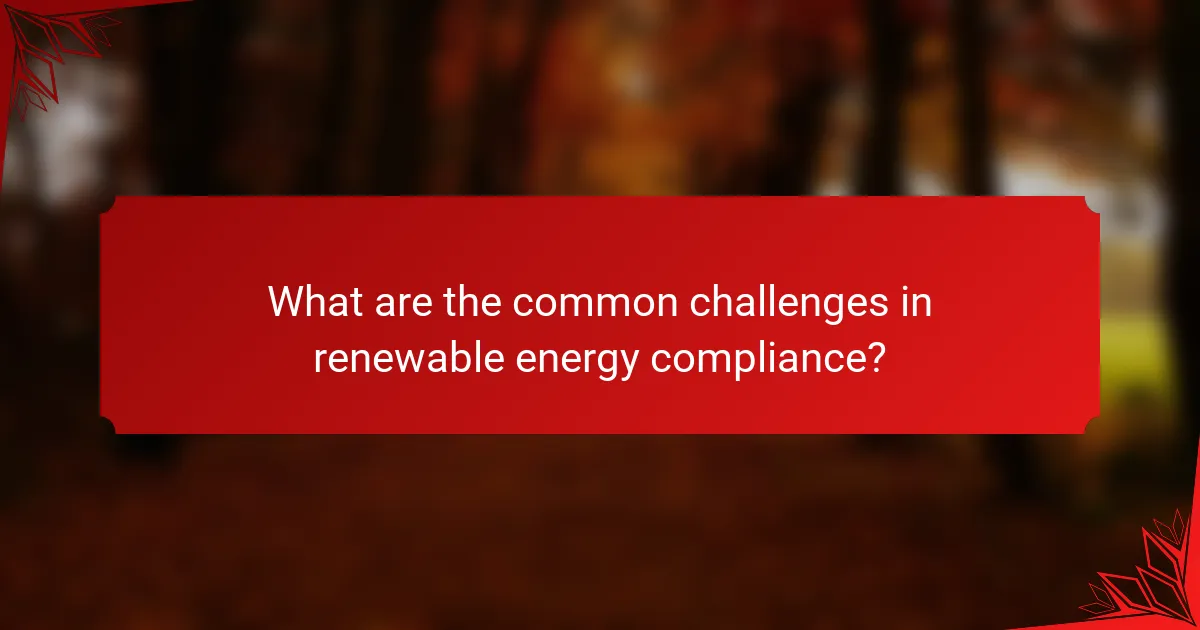
What are the common challenges in renewable energy compliance?
Renewable energy compliance involves navigating various challenges that can hinder project success. Key issues include understanding complex regulations, adapting to changing legislation, and managing extensive data reporting requirements.
Complex regulatory landscape
The regulatory landscape for renewable energy is often intricate and varies significantly by region. Companies must familiarize themselves with local, national, and international regulations, which can include environmental assessments, grid connection rules, and safety standards.
To effectively manage compliance, organizations should maintain a comprehensive compliance checklist that outlines all applicable regulations. Regular training and updates for staff can help ensure that everyone is aware of their responsibilities and the latest regulatory changes.
Changing legislation and standards
Legislation related to renewable energy is frequently updated, which can create uncertainty for companies. New standards may be introduced to promote sustainability or address emerging technologies, requiring businesses to adapt quickly.
Staying informed about legislative changes is crucial. Engaging with industry associations or subscribing to regulatory updates can provide valuable insights and help organizations anticipate shifts that could impact their operations.
Data management and reporting requirements
Data management is a critical component of renewable energy compliance, as companies must collect, analyze, and report various metrics to regulatory bodies. This often includes energy production data, emissions reports, and compliance audits.
Implementing robust data management systems can streamline this process. Organizations should consider using software solutions that facilitate data collection and reporting, ensuring accuracy and efficiency while minimizing the risk of non-compliance penalties.
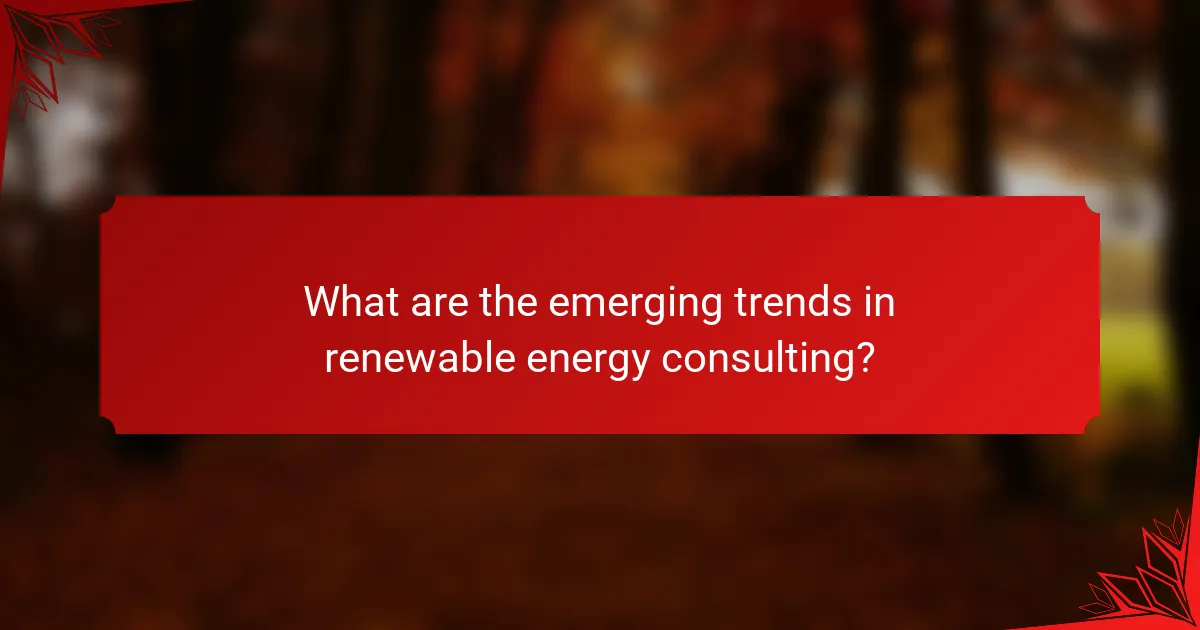
What are the emerging trends in renewable energy consulting?
Emerging trends in renewable energy consulting focus on enhancing compliance, improving sustainability practices, and adapting to evolving regulations. As the sector grows, consultants are increasingly tasked with navigating complex certification processes and ensuring adherence to sustainability standards.
Increased focus on sustainability reporting
Sustainability reporting has become a critical aspect of renewable energy consulting. Companies are now required to disclose their environmental impact, energy consumption, and sustainability initiatives to stakeholders, including investors and regulatory bodies.
Consultants help organizations develop comprehensive sustainability reports that align with frameworks such as the Global Reporting Initiative (GRI) or the Sustainability Accounting Standards Board (SASB). These reports not only enhance transparency but also improve corporate reputation and stakeholder trust.
To effectively implement sustainability reporting, businesses should establish clear metrics for performance evaluation. Regularly updating these reports and engaging with stakeholders can help identify areas for improvement and demonstrate commitment to sustainability goals.
